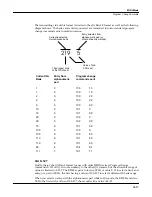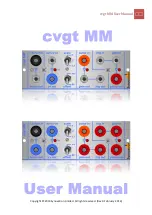
MIDI Mode
Program Change Formats
10-10
Program Change Formats
Straight out of the box, the K2500 has more programs than the MIDI program change
specification can handle (MIDI lets you send program change numbers from 0 to 127 or 1 to 128
only). So we’ve designed a system that makes program selection more flexible. This is true
whether you’re selecting programs from the K2500’s front panel, or via MIDI.
Program Change Type
For use with:
0–127
Older MIDI devices that accept program change commands in the
range from 0–127 only.
Extended
Other K2500s (or K2000s) similarly set, plus all other instruments
that use the Bank Change controller
Kurzweil
K1200s, and 1000s with version 5 software
QA Bank E
Other K2500s (or K2000s) similarly set, when in Quick Access
mode
QA Bank K
K1200s and v5 1000s, when in Quick Access mode
QA 0–127
With the K2500 in Quick Access mode, when using it with older
MIDI devices
First of all, the K2500’s programs (and all of its objects) are numbered and grouped according to
a decimal system, that is, in multiples of ten. This is much easier to keep track of than the
binary-oriented groupings of many synths, which feature banks of 8, 16, or 64 programs.
Next, the K2500 gives you 999 program change numbers to work with. These are organized into
ten banks of 100 each (the memory banks). A program’s object ID is its program change
number, as discussed in Chapter 5. This makes it easy to keep track of your programs. The
K2500 can use several different formats for interpreting Program change commands. The
values for the program change Type parameters on the XMIT and RECV page determine which
format is used, and the one you should select depends on your MIDI system.
If you expect you’ll always change programs from your K2500’s front panel, you can finish this
paragraph and skip the next few sections. In this case, selecting programs is as simple as
entering the program change number (the program’s object ID) on the alphanumeric pad, and
pressing ENTER. Even program numbers above the usual MIDI limit of 127 can be selected this
way.
0-127 Program Change Type
The next simplest system involves connecting your K2500 to an “old” MIDI device—one that
was built before the MIDI Controller 0 program change format was developed. If your MIDI
controller is one of these (if its manual doesn’t mention MIDI Controller 0 program changes, it’s
an “old style” machine), you might want to set the program change Type parameter to a value
of 0–127. This will enable you to select programs 0–127 from the controller. This limits your
range of program selection, but it configures the K2500 to respond predictably to the controller.
(You’ll have to select higher-numbered programs from the K2500’s front panel) Of course, you
can still use the Extended format explained below, but in many cases you’ll have to send two
program change commands to get the program you want.
Note: you can define how the K2500 will respond to and transmit MIDI Controller commands
using the Bank Select parameter, described on page 10-7.



































![ADS AKX-FO(RS)-FO1A-[AKX-FO1]-EN Install Manual preview](http://thumbs.mh-extra.com/thumbs/ads/akx-fo-rs-fo1a-akx-fo1-en/akx-fo-rs-fo1a-akx-fo1-en_install-manual_2853544-01.webp)
